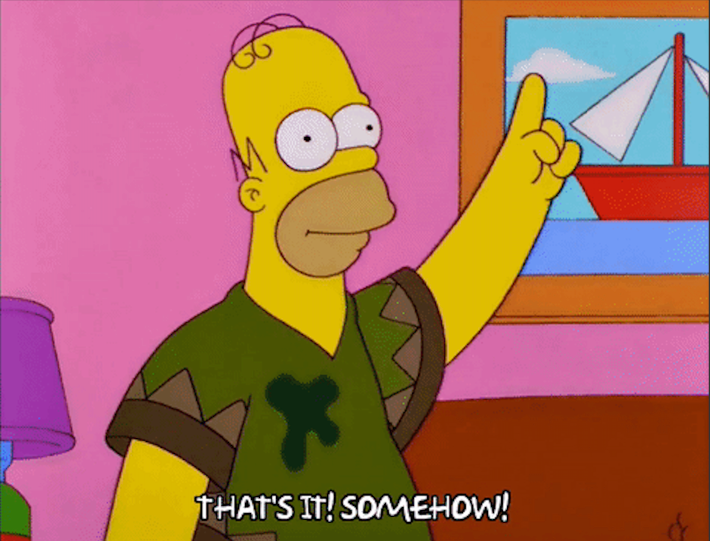I’ve never really been satisfied with the explanation of why so-called “keystone habits” have positive flow-on effects to other areas of our lives.
Even Charles Duhigg, the author who made the notion of keystone habits so popular in his book “The Power of Habit”, describes it like this:
“Making your bed every morning is correlated with better productivity, a greater sense of well-being, and stronger skills at sticking with a budget. It’s not that… a tidy bed causes better grades or less frivolous spending. But somehow those initial shifts start chain reactions that help other good habits take hold” (bold formatting is mine)

There’s lots of material online written about keystone habits these days and the common refrain is that these keystone habits change your self image, make you feel better about yourself and/or be a better person and thereby you start to improve in other areas.
I have always found the notion that bed making in the military makes everyone feel so good about themselves that they become better soldiers, or that having a well made bed before you leave the house means you’re so motivated to succeed that you spend less and make better business decisions that ultimately lead to a more successful life, pretty questionable.
I have no doubt that keystone habits are effective, but I would like to advance an alternative theory about what defines a keystone habit and why they’re effective.
How long does it take you to get from one end of your house to the other?
I’m a huge fan of Marie Kondo’s book The Life Changing Magic of Tidying Up.
The part that really struck a chord for me is the concept of ignoring “flow planning” and “frequency of use” when deciding where to put your things.
The start of the chapter is a complete walk through of how Marie enters her house, where she puts her keys, her wallet, how she empties her bag and so on.
She says that the entire process takes about 5 minutes or so, and she goes on to say that, unless you live in a gigantic mansion, the total time it will take you to walk from one end of your house to the other will be measured in seconds, not minutes.
She makes the observation that clutter is caused by a failure to put things away; that is, the root cause of a problem finding an item is how you last put that item away.
So why do so many people lose so many items that are absolutely critical to their lives, such as their phones, keys, wallets and glasses?
Dumping your wallet and keys on your desk
When you walk into the house, have you ever dumped your wallet and keys on the table where you sit down? Or on the kitchen bench as you put down the shopping?
I used to do this all the time. When I read The Life Changing Magic of Tidying Up the first time, I lived in a house where my office was downstairs right next to the front door. The kitchen was on the middle level and my bedroom was the level above that, so to get from the front door to my bedroom I had to go up like 20 stairs.
Naturally, if I left the house on a work day I would dump my wallet and keys on my desk whenever I came home, along with anything else that happened to be in my pockets, and get back to work.
But when your office is at home, the lines between when you’ve really “left” work can be a little blurred, so sometimes my kids would come home, and I’d start playing with them and then I might not get back to work that day.
Later, I might want to buy something online using my credit card, but my wallet was downstairs in my office, so I had to go down and grab it.
Then other times I would have left my wallet upstairs and I wanted to use my credit card from my desk and I would have to go back upstairs to get my wallet.
Other times I would go downstairs to leave the house thinking I would have my keys on my desk only to discover they weren’t there, and would have to return upstairs and look for them. Usually I had dumped them on the kitchen bench or on the shelf next to my bed.
As trivial as this seems to me now (and probably sounds to you) this was actually something I thought quite a bit about: where was the optimal place to put my wallet and keys so that I would be able to both put them away and get them reliably from the same place with the minimal amount of travel time regardless of whether I was spending my time in the office, bedroom, living room or the kitchen?
The message from Marie Kondo was (and I’m paraphrasing here) “who gives a shit you idiot, it only takes you 10 seconds to get from one end of the house to the other”.
After I read that, and in conjunction with the advice about how to become “kondofied” in a house full of non-Kondoites, I determined that the shelf next to my bed was where everything I owned would be located, including my wallet and keys.
So then, regardless of where I happened to be in the house at the time, if I wanted to use my credit card to purchase something online, I would walk to my room, get my wallet, return to my laptop, use the credit card, then put my wallet back.
When I returned home on a work day, I would walk to my nook where everything I owned was located, put my keys and my wallet there, and then go back downstairs to the office.
This sounds like such a minor detail but it is deceptively powerful. Right now, I can list all of my personal possessions and where they are located. If you were to ask me what’s in my bag I would be able to tell you not only what’s in my bag, but where in my bag it is located and where I’m going to put each of those items when I get home.
I can always find everything I own whenever I need it. The amount of time I save by never having to look for something I need far exceeds the amount of time I spend walking around the house to put things away whenever I return home (and not only that but when you need to grab something you are usually in a much more time critical situation than you are when you need to put something away!)
But something else happened when I started practising this habit with my possessions: I realised there were all sorts of other applications for the same principle.
Impatience disorder
Humans almost universally overestimate the amount of time it will take to perform mundane maintenance tasks and underestimate the amount of time it will take to perform more complicated and interesting tasks.
My kids will spend an hour drawing pictures and cutting them out and sticking them on other bits of paper and making up stories that go along with those pictures, but the task of putting away their pens and paper at the end of playtime, which takes less than 3 minutes (especially if they don’t whine about it) seems like an insurmountable, herculean task.
Once they’re done with the game, they dramatically overestimate how long it will take them to tidy up because their mind has moved onto the next thing they want to do already. There’s no dopamine hit associated with putting the thing they were just playing with away so it just seems like it will take FOREVER.
When you arrive home with your kids and it’s a little late, and there are a bunch of dishes in the sink and crap all over the bench and everyone has school bags and you have your bag and some shopping and wet towels from the beach and the kids are whining or crying because they’re hungry and everyone is a bit frayed and tired, the first instinct is to start cooking.
You’re feeling guilty and emotionally stressed because your kids are crying and you shouldn’t have stayed so long playing with the other families, you just want to make the pain go away. You want to get food on the table so the kids are quiet. But it would only take 10 – 15 minutes to put away all the bags, rinse and stack the dishes, throw out any rubbish, clear the bench and chop some carrots for the kids to snack on while you make the dinner. Doing this before you start cooking not only makes the task of preparing the food more efficient but also makes the task of tidying up after dinner much easier and ensures the kitchen is in a nice tidy state when it’s time to get breakfast the next morning.
But when the kids are screaming at you it’s HARD to follow those processes.
When you know there’s something nagging at you that you just want to get done that day, it’s HARD to run through and delete, defer, delegate, do or respond to everything in your Inbox.
When you rush into the house with an email in your head that you want to write to someone, or knowing that a client has just called you with an urgent problem it’s HARD to walk up 3 flights of steps to put your keys and your wallet on the shelf next to your bed, because we, as humans ALWAYS overestimate the amount of time these things take, and minimise the benefits of doing so.
Chronic versus acute
Modern medicine is pretty amazing. If you arrive in a hospital with your guts hanging out, losing blood and comatose, a team of doctors and surgeons and nurses and anaesthesiologists and administrative staff all fly into action and execute a series of exceedingly complicated steps to keep you alive, and in a staggeringly high number of cases (given the level of complication involved) they manage to actually do so.
It’s astonishing!
But try going into a doctor and saying you’re always feeling tired and you haven’t had a decent bowel movement in 3 days and there’s a weird rash on the back of your knees and your hair is falling out.
If they can’t find a diagnosis, if there’s not some test they can do to identify a set of symptoms for which they have a treatment, they have nothing to tell you.
It’s then up to you to take your confirmation bias shopping for a complementary medicine practitioner or spend hundreds of hours trawling through web forums astroturfed by Dr Oz and Alex Jones to try and figure out what the hell is wrong.
So this chronic condition may persist for many years until finally your health deteriorates to the point that you actually experience heart failure. That’s when the medical profession really shines. Now they have something they can really sink their teeth into. It’s a known problem. They’re on solid ground.
In general, this is a repeating pattern and it’s the same issue as not tidying up before you start cooking or not brushing your teeth when you’re tired or dumping your keys on the kitchen bench or not emptying your inbox so you can instead call back the client who is freaking out or spending too long replying to emails that aren’t important right now instead of deferring them to deal with the ones that are actually important or allowing the climate to warm incrementally until it threatens the entire ecosystem.
It’s much easier to deal with acute problems than chronic problems. Maintenance is BORING, and when things are BORING they take FOREVER. A watched pot NEVER boils. This is ingrained into our psyche, it’s a mass cultural delusion that mundane things take up huge amounts of time.
The key to victory is discipline
There’s a funny scene in Futurama when Fry (and the rest of humanity) gets drafted to fight for Earth under the command of Zapp Brannigan:
Zapp Brannigan: The key to victory is discipline, and that means a well made bed. You will practice until you can make your bed in your sleep.
Fry: You mean while I’m sleeping in it?
Zapp Brannigan: You won’t have time for sleeping, soldier, not with all the bed making you’ll be doing.
This is of course poking fun at the emphasis that the armed forces, who are principally interested in fighting wars and stuff, place on bed making.
So back to my original question: why does it work? How does bed making improve the fighting qualities of our armed forces?
I think that the reason keystone habits are so powerful is because they remind us that maintenance tasks, that taking care of chronic problems, take very little time (especially when you get used to them).
When I started walking up the stairs to put my keys and wallet back in the same spot every single time I used them, it opened my eyes to all the other areas in my life that I was dramatically overestimating the time it would take to perform mundane tasks that, if chronically ignored, would turn into acute catastrophes.
Every day we deal with exciting, acute problems like dealing with an unhappy customer or fixing a big problem, and ignore mundane chronic problems like our health, our taxes and our messy houses.
That’s the real reason that making your bed is an effective keystone habit: you start each day by reminding yourself that most of these maintenance tasks just don’t take that much time to complete.
A new definition of keystone habits
With all that in mind I would like to offer what I think is a more accurate definition of what a keystone habit is:
A keystone habit is a maintenance task that is kind of boring at first but turns out to not take all that long and even becomes fun once you’re good at it.
Bonus points if it actually has some other useful by-product (like reducing the risk of heart disease or increasing operational efficiency) but this isn’t a requirement. Bed making doesn’t improve anything, it just puts you in a maintenance mindset.
You start the day by putting something back how it was when you got there, and that’s the real secret to success.




